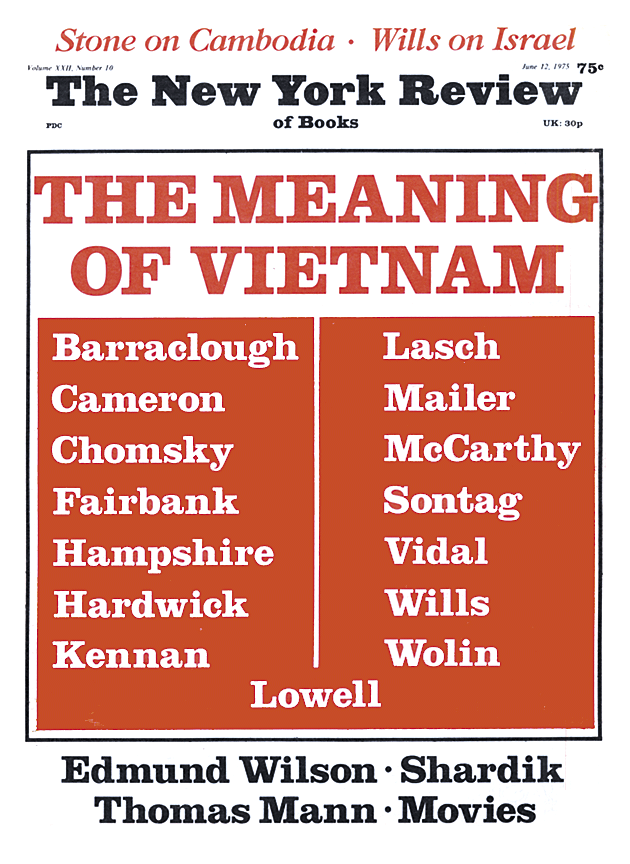In response to:
Farewell to Hitler from the April 3, 1975 issue
To the Editors:
There are several important points in Geoffrey Barraclough’s recent review article [NYR, April 3] that seem so peculiarly regressive, so limited, and even so harmful to the continuing effort to know the full dimensions of German fascism that I must indicate my objections and seek a clarification.
Mr. Barraclough makes the astonishing and weak claim that a source of Hitler’s success and his broad popular appeal “was his classlessness.” How more perfect an example of the lower middle class outlook, personality, and articulated goals do we need? Certainly he was attractive to both the great capitalists and to masses of distressed workers, but his ideology and the bulk of his continuing strength were derived from the small property holders for whom he spoke most directly. Are we to overlook the class origins of fascist ideology because the dictator himself claimed no specific class connection? We need hardly evoke the ghost of Leon Trotsky to recognize German fascism as the “movement and ideology of the wildgewordene Kleinburger, the small bourgeois run amok,” or German National Socialism as “the party of counterrevolutionary despair” (Leon Trotsky, What’s Next, as cited in Isaac Deutscher’s The Prophet Outcast, Trotsky: 1929-1940, New York: Vintage, p. 132). Nationalism, anti-Semitism, aggressive warlike goals, mythical and mystically empowered heroes, and, in spite of Hitler’s so-called “revolution,” the protection of large-scale private economic power in alliance with the powerful state are all middle-class ideals and objectives. Certainly Hitler is no simple mouthpiece or operative for the German capitalist class, but neither is he a classless force in the shaping of the Gemman state. He finally does marry Eva. He hops about like a happy shopkeeper after Munich. He loves his dog. His elations and depressions are familiar to anyone who has ever owned and struggled with a small business. Law and order, an end to chaos, respect for authority are hardly classless slogans or sentiments.
My next concern has to do with the unfinished German revolution. The aristocracy did hold on firmly in nineteenth-century Germany and did not relinquish power to a new middle-class managerial state. Japan also moved into the industrial age with an aristocratic tradition still intact. In both Japan and Germany the aristocracy participated and shared in the rise of an industrial capitalist society until World War I, and Japanese militarism was no more a revolutionary response to international economic relations after 1929 than German fascism. In each case national traditions and history helped to color and shape the specific lines of the new regime. No fascist state, neither Hitler’s, Mussolini’s, or Franco’s, has eliminated aristocracy or abolished prevailing class relationships. The only class fascism seeks to crush is the emerging one, the industrial proletariat and its allies. Its expansionist goals are typically, even archetypically, capitalist: the colonial conquest of new lands and peoples, both internally (Jews) and externally (Europe) for economic and political power.
Legal restraints imposed at Versailles forced the German economy and state to outlawry if it would ever truly recover from World War I. If we are to know fascism better we need to further explore and uncover the extent of German treaty violation after World War I, the cultivation of right-wing groups by the richest and most powerful industrialists and bankers, the secret German re-militarization and war plans of the 1920s, and the support for illegal measures in Germany from American, British, and even French capitalists. We need to develop a better understanding of the “historical bloc theory of Antonio Gramsci as it applies to the interrelationship of the German superstructure (politics, ideology, culture) and substructure (geopolitical economy). Unfortunately, Barraclough’s article, just as most of the works mentioned by him, moves firmly in the direction of particularism and exclusive superstructure analysis. The results can only be as limited as those of his narrow leftist counterparts, unmentioned by him, who are bound to the crudities of economic determinism, or even other conservative historians so intrigued with studies of Hitler’s psychology.
Mr. Barraclough weakly poses the historical problem of Hitler dialectically: either we have made Hitler appear to be too grandiose a force, or else he has been made to seem too insignificant. Barraclough thinks the former emphasis tends to be more correct; Hitler “knew how to act,” and his success “was personal,” and agrees with J.P. Stern “that National Socialism is inconceivable without Hitler.” But if causes and effects are historically interrelated neither viewpoint is correct, or even helpful, at all. Hitler is both product and producer in a dynamic and continuing process. Hitler’s enormous charisma or his stunning insignificance are both interesting and appealing lines of thought, but lead nowhere by themselves, and do not aid in illuminating the roots of German fascism. The tragedy of course is that we will continue to misunderstand and underestimate fascism in a time when we ought to know it inside out.
Philip Y. Nicholson
Nassau Community College
Garden City, New York
This Issue
June 12, 1975


